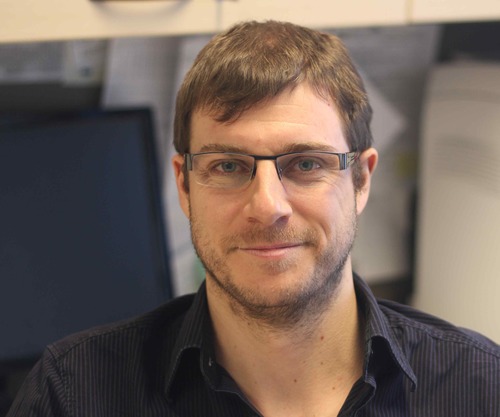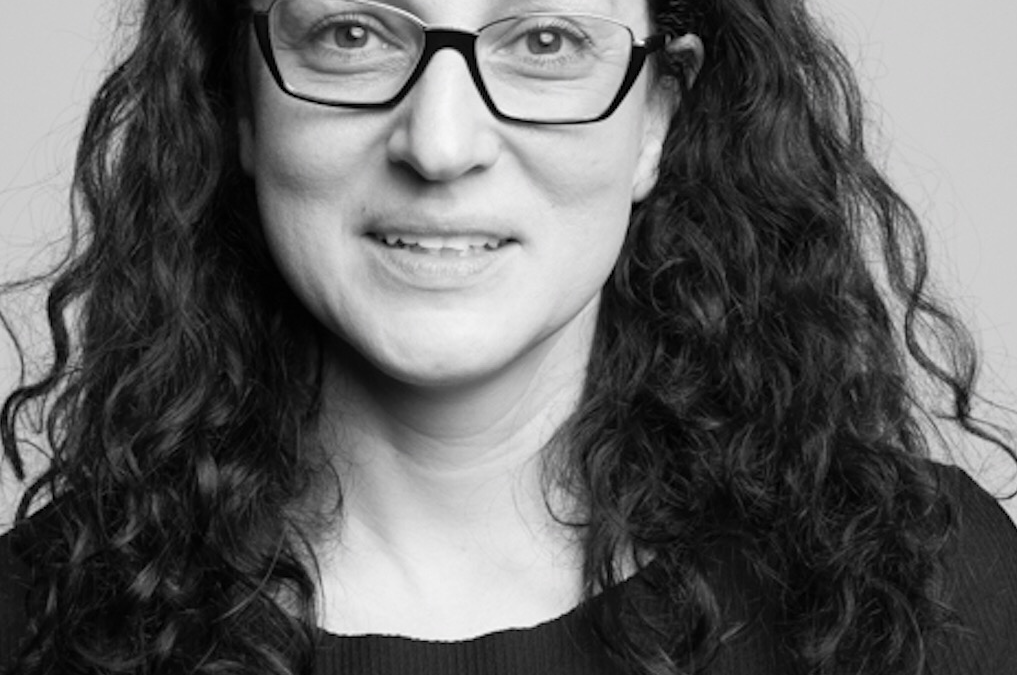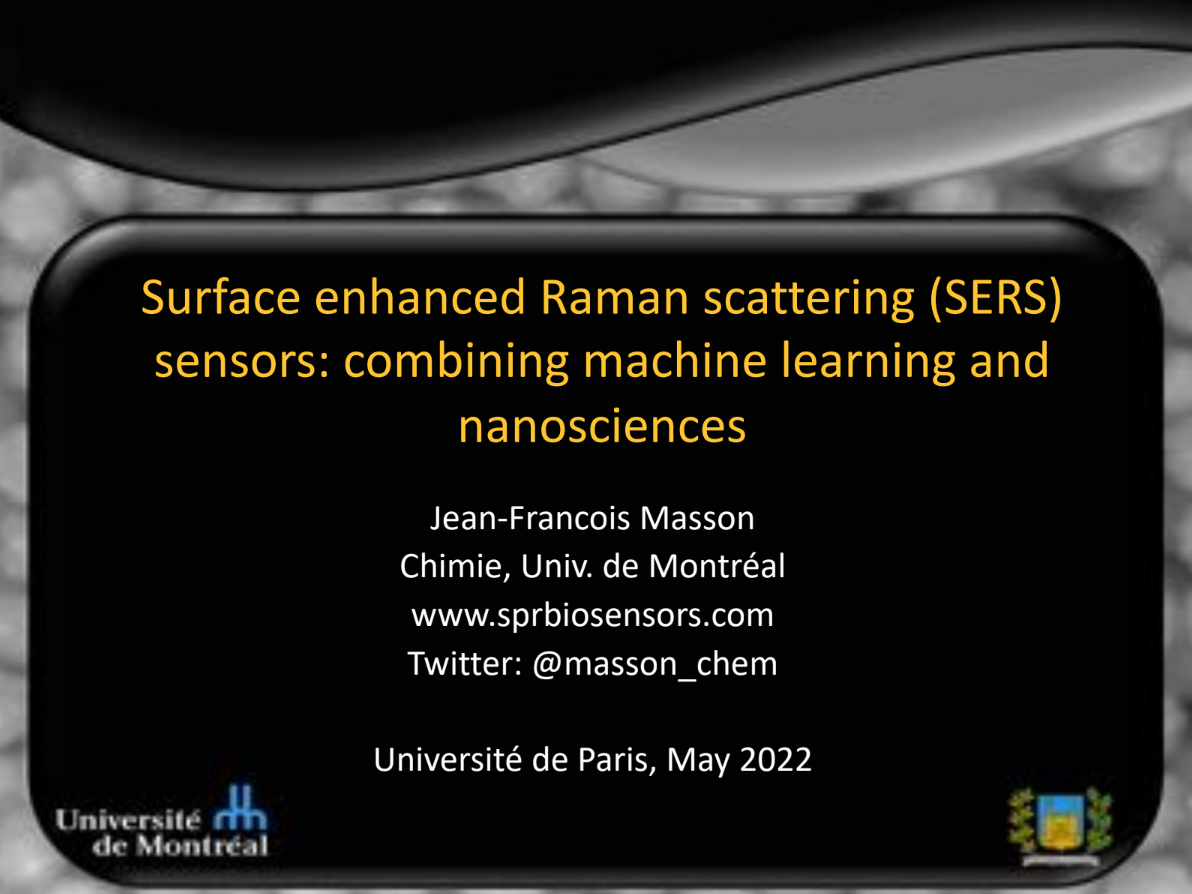Jean-François Masson
May 4, 2022, at 4 PM
Online (Zoom)
Abstract
SERS and Raman spectroscopy yields large data sets with information-rich spectra. Classical linear methods are limited, especially for SERS spectra of single molecules, where the spectra are highly dependent on the orientation of molecules on surfaces and for large data sets. Methods from data sciences are increasingly used to classify spectra into categories and predict SERS spectra for new data based on trained algorithms. For example, we recently introduced the concept of SERS optophysiology, which combines a SERS nanosensor on the tip of a pulled fiber to provide spatially and temporally specific molecular information near or inside biological material. To accomplish this, a SERS nanofiber decorated with a dense and well dispersed array of Au NP has been developed for the measurement of neurotransmitters and other metabolites in proximity of cells. The nanosensors are thus highly compatible with current physiology experiments also relying on similar nanosensors based on electrochemistry and electrophysiology. Specifically, we will show that the SERS optophysiology nanosensor can measure a panel of metabolites near cells in a single experiment. The SERS spectra of these neurotransmitters were identified with a barcoding data processing method, processed with TensorFlow using a convolutional neural network architecture.
This machine-learning driven data processing significantly improved the positive assignment rates for a series of metabolites and allows for complex measurements of the cell’s biochemistry. In addition to these untargeted SERS nanosensors, we also designed molecularly specific sensors to measure pH, H2O2 and heavy metals inside cells using the same nanosensor architecture. This suite of SERS nanosensor will open the door to survey molecular changes in proximity of healthy and diseased cells.

Prof. Jean-François Masson
(Université de Montréal)
Jean-François Masson is full professor of Chemistry at the Université de Montréal. He studied chemistry at the Université de Sherbrooke (BSc), Arizona State University (PhD) and Georgia Tech (postdoc). His laboratory develops new plasmonic materials, instruments, and surface chemistry for the detection of broad range of molecules directly in crude samples, which are then translated to functional sensors for a series of biological, environmental and industrial applications. He has published more than 125 research articles and his research has led to filing more than 10 patents on various instrumental, materials or surface chemistry innovations for biosensing. He is an Associate Editor for ACS Sensors. In 2015, he co-founded Affinité Instruments, a Canadian start-up company commercializing surface plasmon resonance (SPR) instrumentation. Jean-Francois received several awards including the Tomas Hirschfeld award (2005), a NSERC discovery accelerator (2011), the Fred Beamish award (2013) and the McBryde Medal (2019) of the Canadian Society for Chemistry, and an Alexander von Humboldt fellowship, Germany (2013-2014) for research at the Max-Planck Institute. In 2017, he was named Fellow of the Royal Society of Chemistry – UK and more recently, he was named in the 2018 power list of the top 40 under 40 analytical scientists and the 2019 power list of the top 100 most influential analytical scientists from The Analytical Scientist – UK.
Other distinguished lectures

Nikos Paragios – Seeing the Invisible – Doing the Impossible: Reinventing Healthcare with Generative AI-powered diagnosis, treatment and beyond
Nikos ParagiosDecember 04, 2024Vulpian Amphitheater, 12 rue de l’École de Médecine (75006 Paris) Nikos Paragios (52) is distinguished professor of Mathematics (on partial leave) at Ecole CentraleSupelec, the school of engineering ofthe University of Paris-Saclay and...

Alon Halevy – Well-being, AI, and You: Developing AI-based Technology for Well-being
Alon HalevyDecember 04, 2024Vulpian Amphitheater, 12 rue de l’École de Médecine (75006 Paris) Alon Halevy is a Distinguished Engineer in Google Cloud. From 2019 until November 2023, he was a director at Meta’s Reality Labs Research, where he worked on Personal Digital...

Kimon Drakopoulos – Deploying a Data-Driven COVID-19 Screening Policy
Kimon Drakopoulos May 5, 2021, at 4 PM Online (Zoom) Abstract In collaboration with the Greek government, we designed and deployed a nation-wide COVID-19 screening protocol for travelers to Greece. The goals of the protocol were to combine limited...

Julia Stoyanovich – Building Data Equity Systems
Christopher Messenger April 6, 2022, at 4 PM Online (Zoom) Abstract Equity as a social concept — treating people differently depending on their endowments and needs to provide equality of outcome rather than equality of treatment — lends a unifying...

